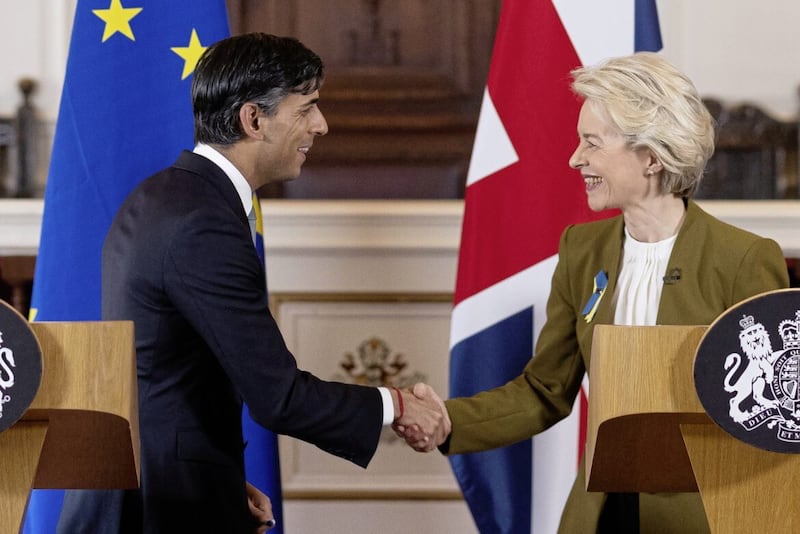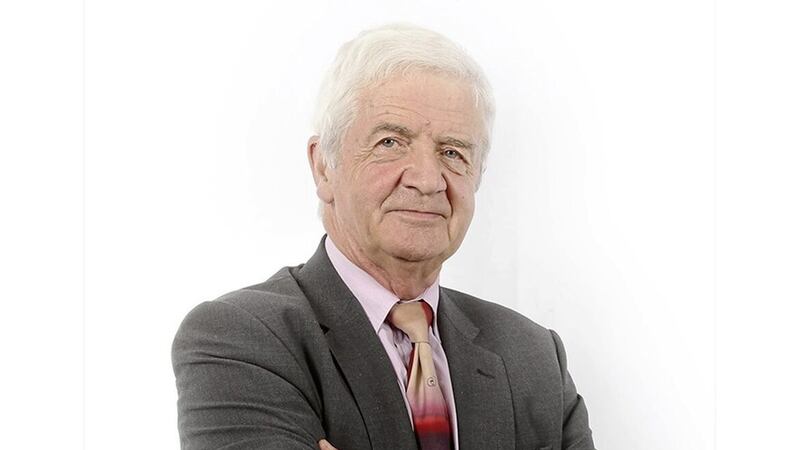There is nothing new in Irish history. Not even the grandly titled Windsor Framework is original in content or intent.
In 1175 the Treaty of Windsor was signed in Windsor Castle (yes, the same one). It was between England’s King Henry II and Irish High King Rory O’Connor, eight years after the Anglo-Normans (England’s then rulers) first invaded Ireland.
Under the treaty, Henry and his lords retained their stolen Irish lands. In return, Rory remained as Irish High King, but under Henry’s jurisdiction. So began 848 years of land grabbing in Ireland.
This week, another English king approved the Windsor Framework, an agreement between Britain’s prime minister and the EU Commission president. (With a medieval disregard for democracy, none of the three determining our future were elected to their positions by popular vote.)
Under the framework, the British retain their lands in Ireland while transferring some legal powers to Europe, from where the Normans originally came. In a unique example of international power-brokering, the Irish must continue paying tribute to England’s king while subject to selected European laws.
Having been ruled by one foreign power for eight centuries, the Irish lords in Ulster have agreed to be ruled by two. Welcome to James Connolly’s worst nightmare. (Connolly argued that we should serve neither king nor kaiser, but Ireland.)
As this column previously suggested, the agreement aims to split unionism, not because the UK or EU are anti-unionist, but because only a unionist split will deliver a restored Assembly.
By invoking the king’s blessing (well, he is Defender of the Faith), Sunak played the Orange card, even including the royal family’s adopted name of Windsor in the framework’s title. He hopes to use the agreement to entice some unionists into Stormont, in the expectation that royalism (support for the monarch) will overcome loyalism (support for the union).
To conceal that Brexit would not apply to the north, Sunak created the “Stormont brake” which is too convoluted to be taken seriously.
Any 30 MLAs can object to a piece of EU legislation, provided it will have a “significant impact” on people’s lives and is not “trivial” (rich pickings for lawyers clarifying those terms). The Assembly’s decision must then be approved by the EU and UK.
The framework represents a climb-down by the EU, although maybe the original protocol was exaggerated with a view to settling for less later. Either way, the EU has finally accepted Brexit.

While nationalists insisted the protocol could never be changed, the DUP saved us from trading chaos. This column was one of the few to suggest that the protocol was damaging our economy. (As a general rule, to be right in Irish politics, just watch the herd and then walk the other way.)
SF, the SDLP, Dublin, Brussels and Washington were all wrong. With less political bias they might have prevented the DUP’s collapse of Stormont. Despite that, none of them had the decency this week to acknowledge their mistakes or their contribution to Stormont’s demise.
Although they were right, the DUP is now subject to continuing abuse. If they do not re-enter Stormont they will be accused of lacking leadership. (“Leadership” now means your opponents’ leader should support your view.)
However, while unionism has won the battle, the outcome of the war remains unclear. The DUP have not got all they wanted, which means that Jeffrey Donaldson will be damned if he returns to Stormont and damned if he doesn’t.
The 1175 Treaty of Windsor did not last long. Rory O'Connor was unable to prevent Norman barons from stealing new territories. He died, the last Gaelic High King of Ireland, in 1198 and the treaty became an English foot in the Irish door.
This week saw a second foot in the northern door. Unionists’ response to it will determine if they split. If they do, Jeffrey will have been unionism’s last high king. Before deciding what to do, he might brush up on Irish history.









